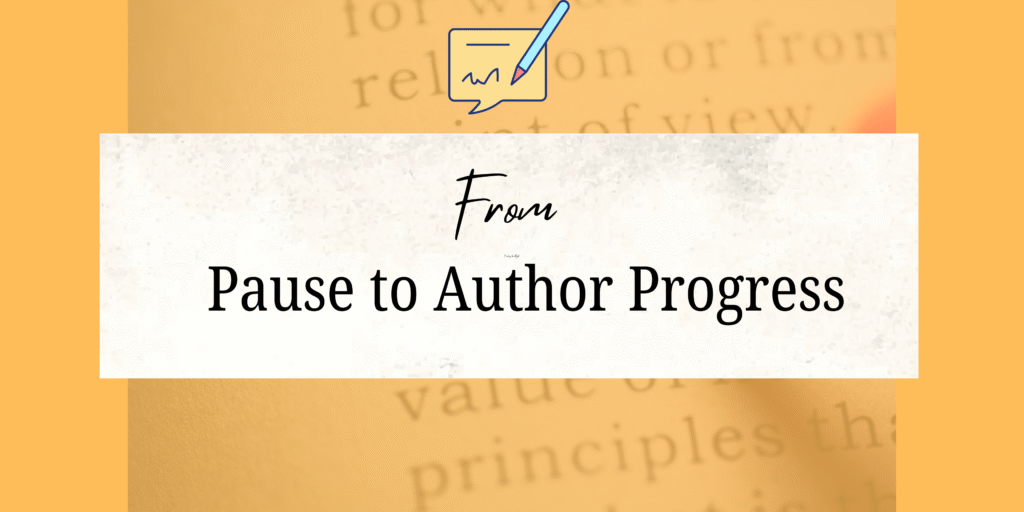
Pause to Progress: Why Writers Need Breaks for Better Creativity
Imagine leafing through pages of your book and thinking, “reads so well; I could not have crafted it!” How can a writer achieve this dream? Writing is an art, a craft, a journey. Like every journey requires pit stops, every craft needs refinement. Refinement is best done with a fresh mind. For writers, taking writing breaks—both during and after writing—is not a luxury but a necessity for creative recovery, productivity, and a much-needed relief from the pressure of writing.
How Do Breaks Improve the Quality of My Writing?
Think of your mind as a canvas. If you continuously paint without stepping back, you may overlook areas that need refinement.
J.K. Rowling—In interviews, Rowling has mentioned that stepping away from writing helped her refine the Harry Potter series, allowing ideas to develop over time.
Writing Breaks Allow You To:
- Enhance clarity: Time away helps you spot inconsistencies and fresh angles.
- Improve efficiency: Pausing enables quicker problem-solving when revisiting your work.
- Sharpen creativity: Your brain needs space to generate new ideas and connections.
Writers often draw inspiration from vibrant festivals. A short break to attend a local cultural event—say, the Jaipur Literature Festival—can refresh perspectives and inspire fresh ideas in storytelling.
What Are Some Effective Ways to Take a Meaningful Break While Writing?
Not all breaks are created equal. Scrolling on social media may not be as beneficial as stepping outside or engaging in a productive activity.
Haruki Murakami—The acclaimed Japanese author follows a strict routine that includes running and swimming. He believes that physical activity helps clear his mind and enhance creativity.
Effective Writing Break Ideas:
- Go for a walk: A stroll in Lodhi Garden or Marine Drive provides a change of scenery.
- Practice mindfulness: Five minutes of deep breathing or yoga can reset focus.
- Read unrelated content: A break with poetry or philosophy rejuvenates thinking.
Taking purposeful pauses helps maintain mental agility, improves the quality of writing and prevents creative fatigue.
How Long Should I Rest After Finishing a Manuscript Before Revising It?
The golden rule: Step away before editing. Let your manuscript breathe before jumping into revisions.
Stephen King – In his book On Writing, King emphasises the value of stepping away from a manuscript before revising, allowing fresh eyes to catch errors and improve storytelling.
| Manuscript Length | Recommended Break Before Revising |
| Short Story (1,500–5,000 words) | 1–3 days |
| Novel (50,000+ words) | 3–4 weeks |
| Poetry Collection | 5–7 days |
Arundhati Roy – She has spoken about the need to detach from writing to gain new perspectives, often taking long breaks to immerse herself in different experiences before returning to her work.
Can Taking Breaks Help Prevent Writer’s Block?
Absolutely! Writer’s block prevention is one of the most significant benefits of structured rest. When stress builds up, creativity stalls, making relaxation vital.
Ways To Prevent Writer’s Block:
- Engage in another creative hobby—painting, music, or even gardening.
- Travel to break routine—a weekend in Udaipur or Coorg can reignite fresh ideas.
- Discuss with fellow writers—join a writing circle, like those hosted by Zorba Books, to explore different perspectives.
Breaks replenish mental energy, reduce frustration, and ultimately restore motivation to write effortlessly.
Final Thought: Pause to Progress
Writing is a dance between creation and contemplation. Honouring the balance between writing break and post-writing rest leads to more impactful storytelling and heightened productivity.
Are you ready to enhance your writing journey? Connect with fellow writers and find inspiration through Zorba Books‘ engaging blogs and discussions. Remember—pausing isn’t stopping. It’s stepping toward better creativity!
Taking breaks isn’t just about resting—it’s about creative recovery, writer’s block prevention, and post-writing reflection.